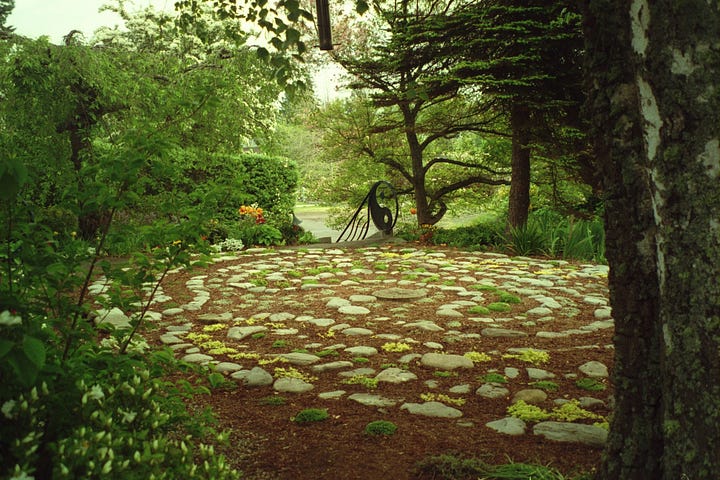A labyrinth, the Seven Circuit pattern, could fit the lawn in front of our newly purchased house in West Seattle. Replacing lawn with a labyrinth would help the environment. The Celtic pattern represents death and rebirth, transformation and wisdom, symbolic of our late-in-life marriage—Chuck was seventy-two and I was sixty. Even though we had both given lengthy care to our cancer-ridden spouses, we entered that mutual care-given relationship again, and with passion. Every walk on the labyrinth stirs the cauldron that is life and our bodies, bringing up all that has settled to the bottom. At the center, we encounter what comes up. Then we retrace our steps back to the beginning gathering insight and perhaps tools for transforming the sludge.
Too much mowing. Stones. I shall have stones for my labyrinth. I cover the grass with cardboard and newspaper for six months and then spread a layer of topsoil on the surface. I search everywhere for stones and finally choose a pallet of river stones from Lightning Creek in Montana. Grandchildren help me place the stones and then the walkable ground cover between them.


For the past two and a half years, I have sat on a bench under the eves facing the labyrinth now twenty years old. Cynthia Moe-Lobeda’s challenging book, Resisting Structural Evil, haunts me. I stand and slowly walk the circuit, balancing on the uneven stones, a practice for balancing my passage into old age. I obsess about the stones. What does Lightning Creek look like today? Did a huge machine dredge the creek to bed rock, destroying every habitat, leaving no tad poles, no nesting places for fish? How many truck loads were hauled away? Do Native Americans own this land? Were the local workers hired for the day paid a decent wage? My desire for something natural to walk on left a place on this Earth no longer natural.
The subtitle of the book reads: Love as Ecological-Economic Vocation. I love my labyrinth. I am grateful for it. If I were to start this project today, I would chose to do it differently: mow the path; forget the stones.
I am one of the privileged on this Earth and, because of the accident of birth into membership in the North American white population, I am responsible for the environmental and economic suffering of a huge number of people and a vast extent of land and water. Not directly. But my life-style indirectly caused that suffering.
Can Right Relation be restored between me and Lightning Creek, and all those beings associated with the area where the stones were harvested? Ijeoma Oluo, in her book So You Want to Talk About Race, suggests that the very recognition that ones thoughts and actions arise from White privilege is a major step forward. I can’t turn the clock back. I can meditated on the suffering and joy messily intertwined and ask for mercy in my gratitude.





Betsy - this is poetic, beautiful and spoken with a deep truth that resonated with me. Thank you for posting.